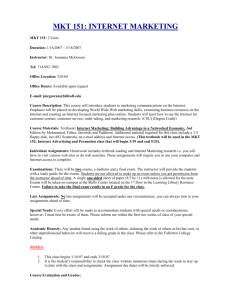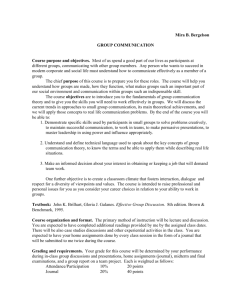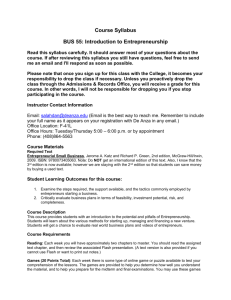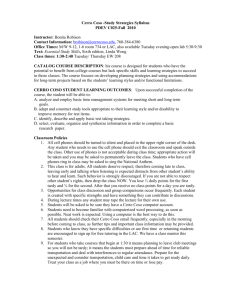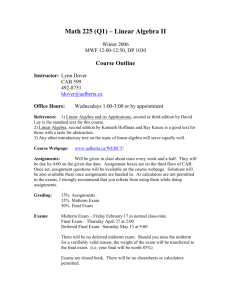PDEVC025
advertisement
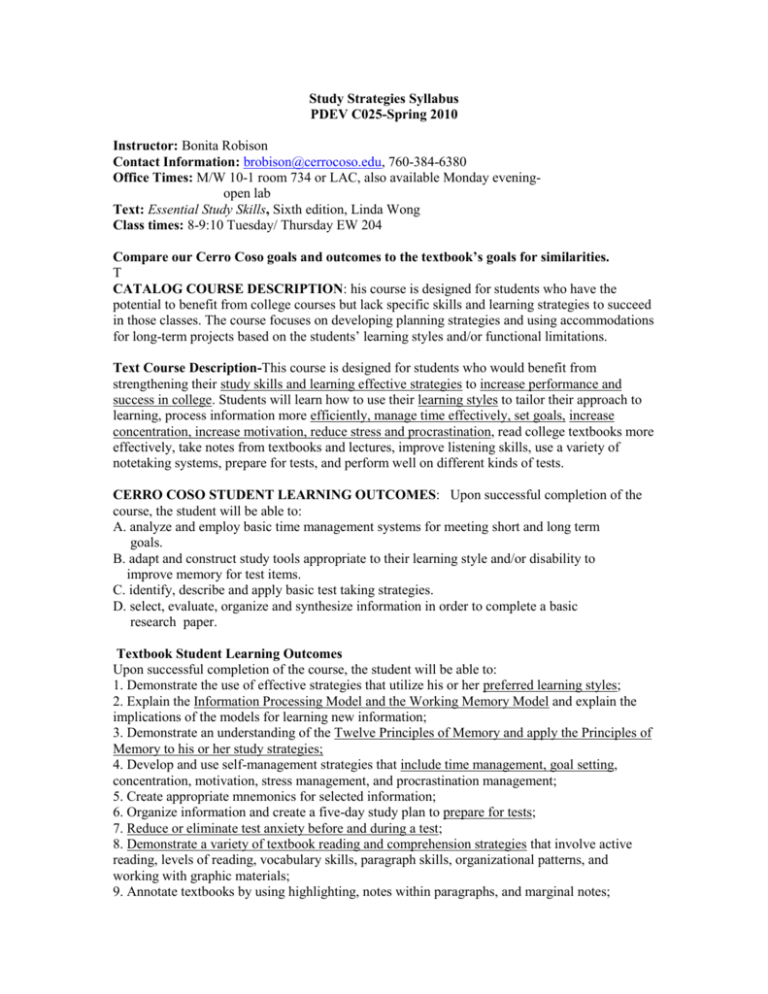
Study Strategies Syllabus PDEV C025-Spring 2010 Instructor: Bonita Robison Contact Information: brobison@cerrocoso.edu, 760-384-6380 Office Times: M/W 10-1 room 734 or LAC, also available Monday eveningopen lab Text: Essential Study Skills, Sixth edition, Linda Wong Class times: 8-9:10 Tuesday/ Thursday EW 204 Compare our Cerro Coso goals and outcomes to the textbook’s goals for similarities. T CATALOG COURSE DESCRIPTION: his course is designed for students who have the potential to benefit from college courses but lack specific skills and learning strategies to succeed in those classes. The course focuses on developing planning strategies and using accommodations for long-term projects based on the students’ learning styles and/or functional limitations. Text Course Description-This course is designed for students who would benefit from strengthening their study skills and learning effective strategies to increase performance and success in college. Students will learn how to use their learning styles to tailor their approach to learning, process information more efficiently, manage time effectively, set goals, increase concentration, increase motivation, reduce stress and procrastination, read college textbooks more effectively, take notes from textbooks and lectures, improve listening skills, use a variety of notetaking systems, prepare for tests, and perform well on different kinds of tests. CERRO COSO STUDENT LEARNING OUTCOMES: Upon successful completion of the course, the student will be able to: A. analyze and employ basic time management systems for meeting short and long term goals. B. adapt and construct study tools appropriate to their learning style and/or disability to improve memory for test items. C. identify, describe and apply basic test taking strategies. D. select, evaluate, organize and synthesize information in order to complete a basic research paper. Textbook Student Learning Outcomes Upon successful completion of the course, the student will be able to: 1. Demonstrate the use of effective strategies that utilize his or her preferred learning styles; 2. Explain the Information Processing Model and the Working Memory Model and explain the implications of the models for learning new information; 3. Demonstrate an understanding of the Twelve Principles of Memory and apply the Principles of Memory to his or her study strategies; 4. Develop and use self-management strategies that include time management, goal setting, concentration, motivation, stress management, and procrastination management; 5. Create appropriate mnemonics for selected information; 6. Organize information and create a five-day study plan to prepare for tests; 7. Reduce or eliminate test anxiety before and during a test; 8. Demonstrate a variety of textbook reading and comprehension strategies that involve active reading, levels of reading, vocabulary skills, paragraph skills, organizational patterns, and working with graphic materials; 9. Annotate textbooks by using highlighting, notes within paragraphs, and marginal notes; 10. Generate textbook and lecture notes using a variety of formats, including Cornell notes, visual mappings, hierarchies, comparison charts, two- and three-column notes, index card notes, and outlining; 11. Apply test preparation and test-taking techniques recommended for objective, recall, math, and essay tests; 12. Use the strategies presented throughout the course to tailor his or her approach to learning academic material and course content Homework/ Grading Policies 1. All homework is due the next class session unless otherwise stated. Assignments more than one day late will receive ½ credit. Messy, ripped out pages will not be graded. 2. There will be a wide variety of assignment formats including self-assessments, concept papers, reflections on your own behavior and what you learned, practice tests and case studies. A variety of activities allow each student the opportunity to excel. 3. Assignments may be taped if the student has great difficulty with writing. 4. If a student prefers, they may chose to submit named assignments by email with ESS preceeding the assignment name and student name. ie. Subject line: ESS case study 4.1- Joe Noe 5. 60% of the grade is based upon in-class participation in discussions, group work plus out of class homework and a final notebook with personal insight. 40% of the grade is based on two take-home exams- a mid-term and a final. My philosophy is that tests for this class are learning exercise; therefore, the test is open book, open notes and open discussion. Classroom Policies 1. All cell phones should be turned to silent and placed in the upper right corner of the desk. Any student who needs to use the cell phone should exit the classroom and speak outside the class. Other use of phones is not acceptable during class time; appropriate action will be taken and you may be asked to permanently leave the class. Students who have cell phones ring in class will be asked to sing the National Anthem. 2. This class is for adults. All students deserve respect; therefore coming late to class, leaving early and talking when listening is expected distracts from other student’s ability to hear and learn. Such behavior is strongly discouraged. If you are not able to respect other student’s rights, then drop the class NOW. 3. Opportunities for class discussion and group comparisons occur frequently. Each student is created with specific strengths and have something they can contribute to discussions. 4. During lecture times any student may tape the lecture for their own use. 5. Students will be asked to be sure they have a Cerro Coso computer account. 6. Students need to become familiar with computerized word processing, as soon as possible. Neat work is expected. Using a computer is the best way to do this. 7. All students should check their Cerro Coso email frequently, especially in the morning before coming to class, as further tips and important class information may be provided. 8. Students who know they have specific difficulties or are first time or returning students are encouraged to sign up for free tutoring in the LAC. 9. For students who take courses beginning at 8:00 a.m., it means the students must prepare ahead of time for reliable transportation and deal with interferences to regular attendance. Prepare for the unexpected and consider transportation, child care and time it takes to get ready daily. Treat your class as a job where you must be there on time or lose pay. DETAILED TOPICAL OUTLINE: A. Time Management 1. Time management and schedules 2. Organizational systems 3. Goal setting for short and long term projects B. Rehearsing & Retrieving Information Using Your Learning Style 1. Creating visual study tools 2. Creating auditory study tools 3. Creating multi-sensory tools 4. Creating mnemonics 5. Creating study tools for difficult vocabulary C. Testing Skills and Memory 1. Taking tests with less stress 2. Study strategies for objective/recognition tests 3. Strategies for recall tests 4. Strategies for essay exams 5. Educated guessing and pulling out learned information D. Long Term Projects 1. Resources beyond the textbook 2. Formulating questions and gathering information 3. Narrowing the topic 4. Taking notes and staying organized 5. Long range planning 9. METHODS OF PRESENTATION: Course instructional methods may include but are not limited to A. lecture B. discussion C. demonstration D. practice E. reading research samples F. class related videos 10. ASSIGNMENTS AND METHODS OF EVALUATION: Assessment of student performance may include but is not limited to A. graded homework B. exams- midterm and final C. research paper D. participation in class activities Sample Student Learning Outcomes for Reading Improvement Auditory Awareness Rubric Rating/Skill Poor Consonants Beginning (A1) Consonants Middle(AI) Consonants End (AI) Smiles (AI) Opens (AI) Rounds (AI) Sliders (AI) Number of Sounds ( A2) Sequence of Sounds (A3) Distinguishing Between similar sounds (A4) Matching Sounds to letters (B) Fair Excellent Sample Pre/ Post Class Average Comparison/Indicators of Class Improvement ? Actual scores below Measure Pre test-class Post Test Class average average 3 sounds 5 sounds Sequencing # of sounds (A1,2,3,4, B) 2 syllables 5 syllables Syllabication Unfamiliar words (C) 70 % Writing single multi-syllable words 10% (D) 5% 50% Writing dictated sentences (D) 5% 50% Proofread and Correct sentences provided(E) 0-5 % 80-90% Students will be able to identify where the course material may be applied outside of class (F) Detailed Assignment List Study Strategies-Spring 2010 Pay close attention to the assignments, reading sequence and due dates. Be sure to read to find strategies in order to determine strategies that will work for you. This class has been shortened by two weeks; therefore, some chapters and topics will have less time for the same work to complete. In each chapter as you read do the check point and self-check questions- These types of questions will be on the midterm and final. Also self-check with reflections. There will be a final reflection for the course. These assignments count as participation and prepare you for exams while teaching important learning strategies. These following listed assignments are to be handed in the next class period unless otherwise noted. the case studies- Case studies will be on your exams to show knowledge application. chapter review-Also included on exams other exercises as assigned below Date 2/2 2/4 Topic Introduction, Syllabus, Getting off to the Right Start Using Materials, Resources and Computers Chapter 4-Schedules and Balance Begin term and weekly schedules 2/9 Chapter 4 -Goals and Goal Setting 2/11 Chapter 5-Motivation and Procrastination 2/16 Chapter 5-Stress and Concentration 2/18 Chapter 1 - Learning Styles 2/23 2/25 Chapter 2-Information Processing Model Chapter 2- Working Memory 3/2 Chapter 3-SAVE CRIB FOTO Assignments Collected 1.Skill Assessments- Chapters. 4,5,1,2,3&6 Answers in Appendix A 2.Set up a Notebook/ Skim Textbook * Time monitor due 2/11 1.Skill Assessments- Chapters12,13,7,8,9 2.Read pp. 90-107 3.Do Ex 4.1 Finish term and weekly schedules 1.Read pp.108-121 2.Ex 4.9 3. Review Questions * Time monitor due 2/11 1.Read pp.132-138 &145-153 2. Ex 5.2 3. Ex 5.4 1. pp.139-144 & 125-131 2. Choose one strategy to illustrate or demonstrate to the class. 1.Read pp. 2-23 2. Do EX 1.2 & 1.4 3. Chapter Review 1-3 on T/F and M/C only 1.Read pp.35-50 2. Ex 2.3 1.Read pp.50-61 2. Ex 2.7 3. Chapter Review 1.Read pp.61-89 Memory 3/ 4 Finish Ch 3 Begin Ch 6 3/9 Chapter 6- Test Anxiety &Test Performance 3/11 Chapter 1 3 Essay Exams 3/16 Chapter 13-Strategies for Recall and Math tests 3/18 Hand in midterm, midterm review& begin Research paper Spring Break 3/2028 2.Ex 3.3 3.Ex 3.4 1.Read pp.155-163 &175-178 2.Chapter 3 Review 3.Ex 6.3 1.Read pp.169-174 & 164-167& 180&181 2. Ex 6.4 3. Chapter Review 1.Read pp.378-388 2. Ex 13.6 3. Ex 13.8 *Midterm handed out due 3/18 1.Read pp.365-378 2.Ex 13.2 & 13.4 * Continue work on Midterm- Midterm due 3/18 Make a list of 5 topics to add to the class research project Make a list of 5 topics for a class research project Homework exercises are not listed below. Students must write these down in class as practice Read pp.339-351 3/30 Chapter 12-Strtaegies for T/F & Multiple Choice 4/1 Chapter 12- Strategies for other objective exams Read pp.352-363 4/6 Chapter 7-Reading and Surveying Read pp.183-193 4/8 Chapter 7-Vocabulary and paragraphs Read pp. 200-204 & 194-197 plus 208&209 4/13 Chapter 8-Active Reading& Content Reading Read pp. 211-222 & 239-245 plus 332 4/15 Chapter 8&11-Organization and Graphic materials Mind maps and visual organizers, Source note cards Chapter 9 Reading text materials, Read pp. 223-237 & 248& 249 plus 316-319 Begin Source cards. Chapter 9 annotating for research & visual organizers for outlining Research paper organization, Research paper narrow or expand topic Read pp. 255-261,& 274-309 *Add details to either the mind map or outline 4/20 4/22 4/27 Read pp251-255 *Make a mind map of the research project/convert to outline *Write a rough draft and Compile Resources 4/29 Research paper- APA format& adding resources *Add resources in correct format and Rewrite 5/4 Review & Questions on anything 5/6 Final exam handed out *Write 5 final exam questions, finish papers & notebook Work on final and summary reflection statement. 5/13 Final- turn in exam/ notebook check off You may bring goodies for a well deserved party Have a great summer!

